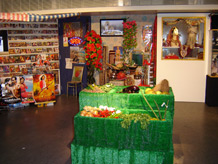
Southall Story exhibition at the South Bank Centre, London.
New funds for cultural history project
Southall is a large suburb of west London which has been a place of migration for diasporic communities, most particularly those of South Asian origin.
It is currently the focus of a major new research project which will document Southall’s cultural history since 1979, by focusing on the communities who came together to resist racism and violence which threatened the town at that time.
The two and a half year project is funded by the Arts and Humanities Research Council (AHRC) and led by the University of Exeter’s Drama department. The project is in collaboration with Dr Ann David and colleagues from the Dance Studies at Roehampton University, and the founding members of 'The Southall Story' organisation. World renowned tabla musician and composer Dr Kuljit Bhamra MBE is one of the founding members of the organisation, and is a consultant on the ‘Southall Story’ project which celebrates the achievements of the area. Bhamra said, ‘I have been collating stories and images on the music created by this vibrant community for the last two decades and for me The Southall Story is a significant collection of oral and other histories. The project tells of an inspired community; its people, heritage and arts.’
The research will document the events in Southall from 1979 focusing on the range of social, political and cultural organisations and festivals which were created to unite the communities together in resistance and celebration. New forms of performing arts were created out of the coming together of artists from different communities and backgrounds, leading to innovative forms of performance and artistic expression.
Dr Jerri Daboo, Senior Lecturer in Drama at the University of Exeter, said ‘This connection between the arts and the social-political contexts is of great importance in the subsequent cultural history of the town, and its contribution to the wider cultural life of Britain, and beyond.’
She added, ‘The project is an exciting opportunity to document, share and create a lasting legacy for this diasporic town. We are interested in looking at the ways in which different groups within the community came together to resist violence and racism, and created new forms of performance and political activism. This is particularly important in the current climate of questioning both the effects of multiculturalism, as well as the position and relevance of the arts in society.’
The Royal Geographical Society, which is one of the partner organisations will host workshops with the project team and members of the communities from Southall to examine their collections of maps of both Southall and the Punjab. It is hoped that this will raise some interesting points about migration for members of the Southall community.
The project's outputs include a co-authored book, a digital archive, a symposium and an exhibition.
Date: 18 February 2011
